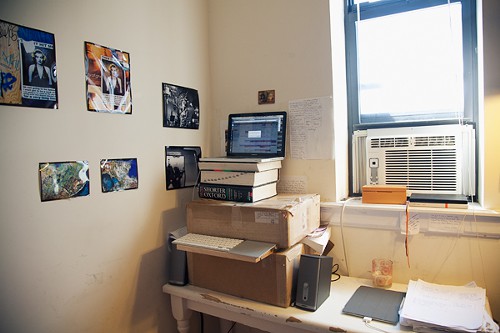The Economics of Being a Brooklyn Writer: or Writing Has Become a Privileged Profession


Writers do not become writers because they want to get rich. Or, at least, while some writers, at some point in their careers (usually at the very, very beginning), might fantasize about selling a debut novel for a high six-figure sum, or imagine falling into an editorial position at a venerable magazine like the New Yorker or Harper’s, those sort of outsized dreams usually dissipate not long after they’re conceived. It is very rare to become wealthy from writing. It is also very hard work, and usually takes some time—time being a luxury, of course, one usually only afforded by money. And then still, it is very rare. There are no guarantees. And that’s why, here in Brooklyn, for every Jonathan Safran Foer, there are scores of freelance writers who churn out content for little or even no money, hoping that it will lead to a job. And for every Jennifer Egan (who, it should be pointed out, did not experience anything resembling overnight success) there are dozens of recent MFA-weilding adjuncts who count among their limited possessions crippling student loan debt and a dozen unfinished Word docs with titles like “thissucks” or “fuckwritingfuckitforever.” But so how do aspiring (or even actual) writers survive in Brooklyn anymore? Is it even possible to be a struggling artist in a place where studio apartments go for $2,000 a month? And how can anyone pay that kind of preposterous rent when the only writing they’ve had published is a handful of “It Happened to Me” stories for xoJane in which they recall the time a guinea pig crawled up their butthole and died?
Well, actually, I don’t really know. I don’t really know how most aspiring writers survive out of the gate because it seems like it’d be pretty close to impossible. Or at least, if not impossible, it has become increasingly difficult to make a living or start to make a living as a young writer without some serious help. Easily one of the more controversial topics of conversation these days (ranking right up there with politics and religion and Ben Affleck as Batman) is that of the unpaid internship. The debate goes a little something like this: one side says that unpaid internships are inherently unfair because they privilege wealthy young people who can afford to work for free in order to get a foot in the door, while the other side says, sure, but it’s what we’ve always done and stop whining you spoiled millennials, why do you need to work for money anyway?(Full disclosure: Northside Media Group employs unpaid interns, so, yeah.) The problem, as I see it, with this argument though is that it’s a total straw man. Is it always unethical to have anyone work for you for free? At the risk of sounding spineless, I’d have to say, not necessarily. Not if the interns are given an opportunity to learn important skills, gain experience and connections that could help them get a job later, and are not over-worked. That said, should interns earn a salary? I tend to think they should. But here’s the problem, especially in a city like New York: even when interns are earning a salary, it’s rarely more than minimum wage which isn’t, in this city, a living wage at all. So the issue isn’t even about paid or unpaid internships, it’s about the injustice of having entry-level positions (whether paid or unpaid) in any industry that are perpetually out-of-reach for anyone who isn’t getting additional financial support, whether in the form of other employment, or in the form of help from family. If it’s a question of which is worse, an unpaid intern who earns college credit and works 25 hours a week and gets valuable experience versus a low-paid entry-level worker who clocks in at 40+ hours a week, I’d actually go with the paid worker as having it worse.
But so let’s take a look at a hypothetical intern at a successful online publication. First of all, congratulations to this young writer! Even getting one of these positions in a competitive place like New York is winning a lottery of sorts. Not the kind of lottery with a big payout, but still. Anyway, if this person is interning and working 25 hours per week and getting paid minimum wage, they have two choices, work another job or be rich. I mean, choice number two, right? But let’s say this intern can’t just choose to be rich. Bummer. And so they get another job. And they work 30 hours a week at that job probably not making much more than minimum wage, but they don’t have the mental energy to invest in their internship the way that some other intern, who doesn’t have to work another job and doesn’t have to carry the unbelievably oppressive burden of living in debt on their shoulders and can instead invest time and energy into doing extra for the job where they’re interning or starting out in some other entry-level capacity, who do you think is going to be more successful? Nine times out of ten, it’s gonna be the wealthy kid. Obviously.
You might also like 





















